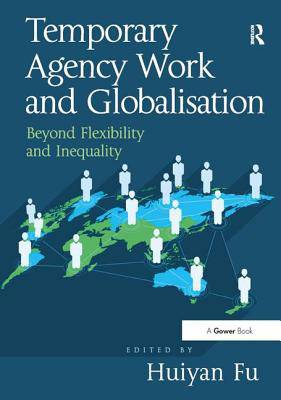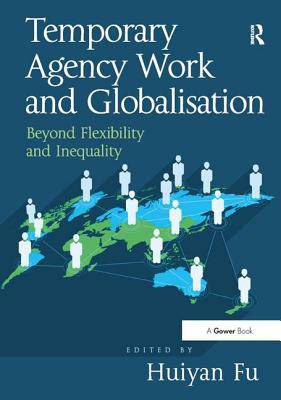
- Afhalen na 1 uur in een winkel met voorraad
- Gratis thuislevering in België vanaf € 30
- Ruim aanbod met 7 miljoen producten
- Afhalen na 1 uur in een winkel met voorraad
- Gratis thuislevering in België vanaf € 30
- Ruim aanbod met 7 miljoen producten
Zoeken
Temporary Agency Work and Globalisation
Beyond Flexibility and Inequality
Huiyan Fu
Hardcover | Engels
€ 195,95
+ 391 punten
Uitvoering
Omschrijving
Despite its geographic and industry expansion as part of the ongoing globalisation of service activity, temporary agency work (TAW) is relatively understudied. TAW is characterised by a distinct triangular structure where workers are typically hired by staffing or employment agencies while being 'dispatched' to firms that use them as a type of temporary or non-regular labour. This agency-mediated labour dispatching, as a newly institutionalised industry, has registered rapid growth rates over recent decades across vast swathes of the globe. To a great degree, TAW is part of a wider structural transformation of work and employment under neoliberalism. Arguably, controversy over the expanding non-regular workforce is at its most acute when it comes to unsavoury labour-selling practices. In this connection, TAW is an exemplary field in which to examine today's 'flexible' capitalism and its concomitant phenomenon, i.e. 'inequality'. Featuring holistic and interdisciplinary perspectives, this edited collection provides a comprehensive overview of TAW, in an international context. It reveals how the TAW industry is intertwined with the changing relationship between the state, corporations and labour unions at the institutional-structural level, and also the perceptions and experiences of ordinary workers in everyday practice. By combining global and local forces, macro and micro levels of analysis, and theoretical and empirical investigations, the book offers fresh insights into recurring issues of labour flexibility and inequality, contributes to practical applications and facilitates fruitful cross-national collaborations.
Alleen bij Standaard Boekhandel
+ 391 punten op je klantenkaart van Standaard Boekhandel
Beoordelingen
We publiceren alleen reviews die voldoen aan de voorwaarden voor reviews. Bekijk onze voorwaarden voor reviews.












